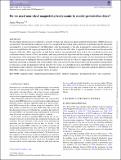Do we need non-ideal magnetohydrodynamic to model protostellar discs?
Abstract
We investigate and discuss protostellar discs in terms of where the various non-ideal magnetohydrodynamics (MHD) processes are important. We find that the traditional picture of a magnetised disc (where Ohmic resistivity is dominant near the mid-plane, surrounded by a region dominated by the Hall effect, with the remainder of the disc dominated by ambipolar diffusion) is a great oversimplification. In simple parameterised discs, we find that the Hall effect is typically the dominant term throughout the majority of the disc. More importantly, we find that in much of our parameterised discs, at least two non-ideal processes have coefficients within a factor of 10 of one another, indicating that both are important and that naming a dominant term underplays the importance of the other terms. Discs that were self-consistently formed in our previous studies are also dominated by the Hall effect, and the ratio of ambipolar diffusion and Hall coefficients is typically less than 10, suggesting that both terms are equally important and listing a dominant term is misleading. These conclusions become more robust once the magnetic field geometry is taken into account. In agreement with the literature we review, we conclude that non-ideal MHD processes are important for the formation and evolution of protostellar discs. Ignoring any of the non-ideal processes, especially ambipolar diffusion and the Hall effect, yields an incorrect description of disc evolution.
Citation
Wurster , J 2021 , ' Do we need non-ideal magnetohydrodynamic to model protostellar discs? ' , Monthly Notices of the Royal Astronomical Society , vol. 501 , no. 4 , pp. 5873–5891 . https://doi.org/10.1093/mnras/staa3943
Publication
Monthly Notices of the Royal Astronomical Society
Status
Peer reviewed
ISSN
0035-8711Type
Journal article
Description
Jointly funded by STFC and the Large Facilities Capital Fund of BIS (STFC grants ST/K000373/1, ST/K0003259/1, and ST/M006948/1), and the University of Exeter Supercomputer, Isca, a DiRAC Facility jointly funded by STFC, the Large Facilities Capital Fund of BIS, and the University of Exeter. The equipment was funded by BEIS capital funding via STFC capital grants ST/K000373/1 and ST/R002363/1 and STFC DiRAC Operations grant ST/R001014/1. DiRAC is part of the National e-Infrastructure.Collections
Items in the St Andrews Research Repository are protected by copyright, with all rights reserved, unless otherwise indicated.

